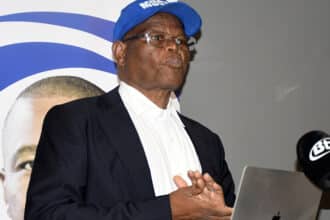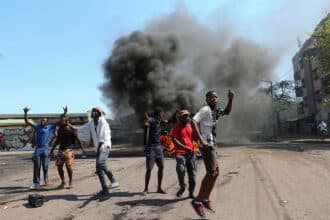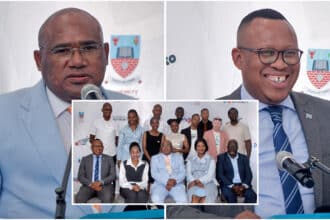Woman on top
Wedu Motswetla is living proof that no matter what obstacles we face in life, through hard work and faith anything is possible.
Back in December, the 43-year-old Marapong native was named acting Chief Executive Officer (CEO) of the Botswana National Olympic Committee (BNOC).
Her appointment marked the latest high in a career that began in 2009 when she joined the organisation as an intern.
For a woman who failed Form Two twice, such success is all the more impressive.
With the Olympics just weeks away, The Voice’s Portia Mlilo caught up with Motswetla to find out a bit more about life in the BNOC hot seat and her remarkable journey to get there.
How did you end in sports administration?
I never had interest in being a Sports Administrator.
After Tirelo Sechaba, the government allowed us to study abroad and I went to the National Stadium where we were applying for scholarships and I noticed a prospectus of the University of Johannesburg.
When I browsed through I saw Sports Administration and Management course and I became interested because I felt it was unique.
After finishing my Bachelor of Sport Management in 2006 I couldn’t find a job and I decided to be Physics temporary teacher at Shangano Junior School.
Three years later, I joined the BNOC as an intern.
So what exactly does the BNOC do?
BNOC is affiliated to International Olympic Movement.
Our mandate is incorporating Commonwealth Games Botswana, facilitating the development of elite athletes for successful competition at the Olympic and Commonwealth Games.
We are also responsible for elite scholarship grants, training of coaches and administrators, athletes’ welfare, and preparation of Team Botswana for major Games.
We also have the responsibility to educate the public and athletes on anti-doping to ensure they do not wind up using performance enhancement prohibited substances.
And on a more personal note, what does your role as acting CEO entail?
I am the captain of the ship and ensure that the BNOC delivers its mandate and strategic plan.
When I was appointed, our strategic plan was coming to an end so I had to spearhead the development of the new one. We are done and soon we will be implementing the 2021/2022 strategic plan.
I am an overseer of the organisation in all the departments and ensuring that we prepare a team to represent the country at the Olympics.
As a woman, what’s it like running a predominantly male-dominated body?
Sometimes I even forget that I am a woman!
I make it a point that I put away that mentality and focus on becoming a leader that can deliver.
I just had to understand my role and the mandate of the organisation.
Fortunately, I have been part of the organisation for a long time and I understand its culture.
I had the opportunity to learn from a young age though I was not a decision-maker.
I learnt a lot from my past leader on how to manage stakeholders, build relationships, and sports management.
When I get stuck, I contact those who led this organisation before and they assist, even from the national federations.
Sport is also political but you cannot make a decision that will please everyone.
You have to be firm! I never felt undermined by male colleagues.
Were you part of the team trying to convince Nijel Amos not to sell his medal?
He wrote a letter to the BNOC informing us that he wants to sell his medal.
One thing people must understand is that a medal is a personal asset.
The only thing we could do was to advise him not to sell but we can’t stop him.
It holds a sentimental value not equivalent to money.
We wrote a letter convincing him not to sell and we are yet to hear from him.
What challenges have you faced as a leader?
The greatest challenge was the outbreak of Covid-19 and the suspension of sport.
There was no easy access to competitions.
My greatest fear has been losing an athlete or an official due to Covid.
I am glad they have been vaccinated.
In the past, as BNOC our challenge has been funding for the Games but we had submitted the budget before Covid and we re-submitted a new one after and the government approved it well on time.
The other issue is, dealing with athletes is a challenge but they make mistakes like any other child – you have to be supportive but if it is necessary, enforce disciplinary measures.
The challenge is that athletes do not belong to the BNOC they are under national federations.
You will recall that we had a challenge with Baboloki Thebe and Okabetse Nkobolo involved in a car accident that left an athlete wheelchair-bound.
It was an unfortunate incident.
On a happier note, this year’s Olympic team contains more female members (four) than ever before – what’s your take on that?
IOC is encouraging the development and empowerment of women in sport.
The IOC President is also passionate about increasing women’s participation and this shows we are on the right track.
It is also a challenge that going forward, how we ensure that the numbers do not drop.
As BNSC, BNSO, and Women and Sport Botswana, we need to see how we can have more female athletes in the next Olympics.
Athletes have been pretty vocal in complaining about their welfare and camp allowances – what are you doing to address such issues?
As much as we understand that the allowance they get is not enough, we budget according to what is in the policy of Botswana Sport.
We have already advised policymakers and advocated for allowances to be reviewed together with BNSC and the Ministry of Sport.
If you look at other countries, before the Games the government is not doing much in terms of preparing for the Games.
I am not saying our allowance is enough but we have to balance and ensure that a lot of funding goes towards preparation.
I hope going forward things will change.
Kindly share the athletes’ incentives that come with qualifying for the Olympics.
In a quest to increase qualifying athletes, we came up with qualification incentives.
When an athlete qualifies, they get P8, 333 monthly. Some were already in the Olympic Solidarity Scholarships and they are still receiving allowances.
They do a lot in terms of sacrificing for the country and we can never say there is any amount that is enough.
Initially Botswana’s Olympic medal target was four but that has since been reduced to two, what influenced the change?
Qualifications had started in 2019 and in October last year, only three athletes had qualified so we thought our chances of getting more medals is very slim.
The Covid outbreak gave us another opportunity to qualify more athletes.
However, we did not reverse our target because we realised athletes are not getting the chance to attend more competitions to prepare adequately.
There were a lot of setbacks. African championships were canceled, Boxing World Championships were also canceled.
There is training for qualifying, training to be fit and master the skills, training for the competition, and training to win.
They did not have these opportunities hence our target remains at two.
Many believe the BNOC should merge with BNSC – what are your thoughts on this?
In the end sports must win.
If the merging makes sport win then I will support it and if it happens when the two are run separately then let it be.
I will not be against any model that will give us the results we are intending to get.
Why are there so few women in sports – in terms of both participation and administration?
When I attended Athletics Nationals, in the juniors some races did not have women participants; if we don’t have them at that level, then we will never have elite athletes in those disciplines.
Our school sport is currently not functioning.
There has been the well-documented Covid challenge, the Ministry had its challenges in school sport.
Women have many responsibilities and have internal limitations.
You must support them, be understanding and accommodative.
We need to realise their potential.
We need to be able to give women opportunities so that they can be empowered.
We need to create a conducive environment where women can raise their hands.
What does it take to be a great Sports Administrator?
Be open-minded. Be a team player and accommodate other people’s opinions to make informed decisions.
You can’t be a one-man show.
One of my former leaders, Kamanga once said the worst thing a leader can do is failing to make a decision whether wrong or right.
You must be able to accept criticism.
You can turn negative ones into positives.
Who is your inspiration?
My mother is my inspiration.
Our father died when I was at Tirelo Sechaba and she was working in a supermarket, making ends meet to make sure that she provides for me and my brother.
Our neighbours, the Maphorisas, also inspired me.
I failed my Form Two examination twice.
The third time I moved in with Maphorisa and worked as a nanny and he paid for my night school studies.
I managed to pass my examinations and that was my breakthrough.
Wow – and on that impressive note, Thank God It’s Friday, what are your plans for the weekend?
I will be just home with my two kids since I’m in the bubble and I will be traveling to Tokyo soon for the Olympics.







